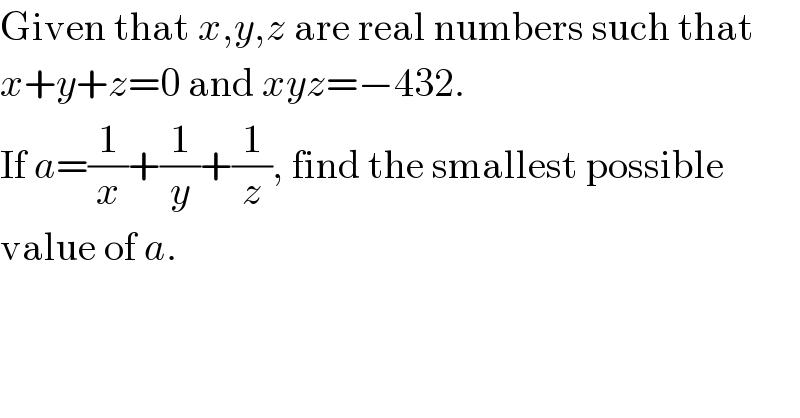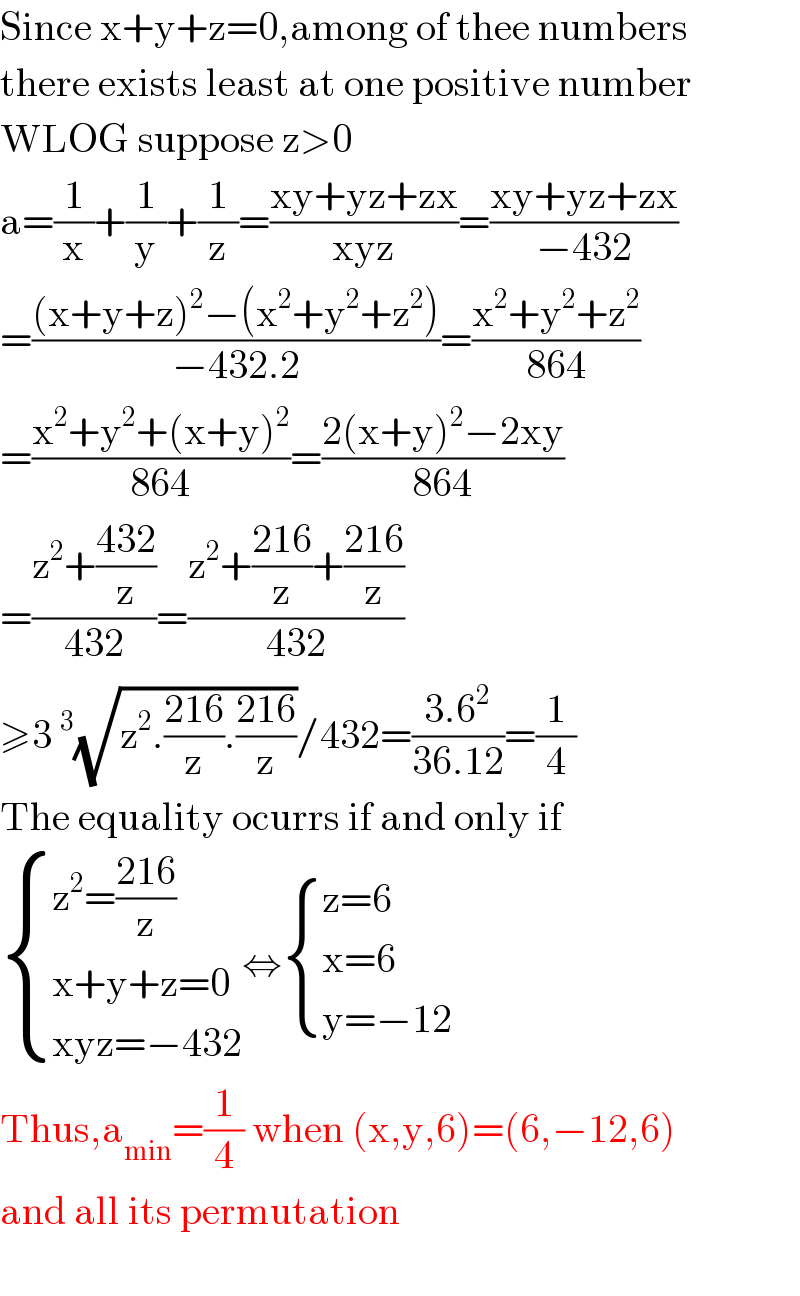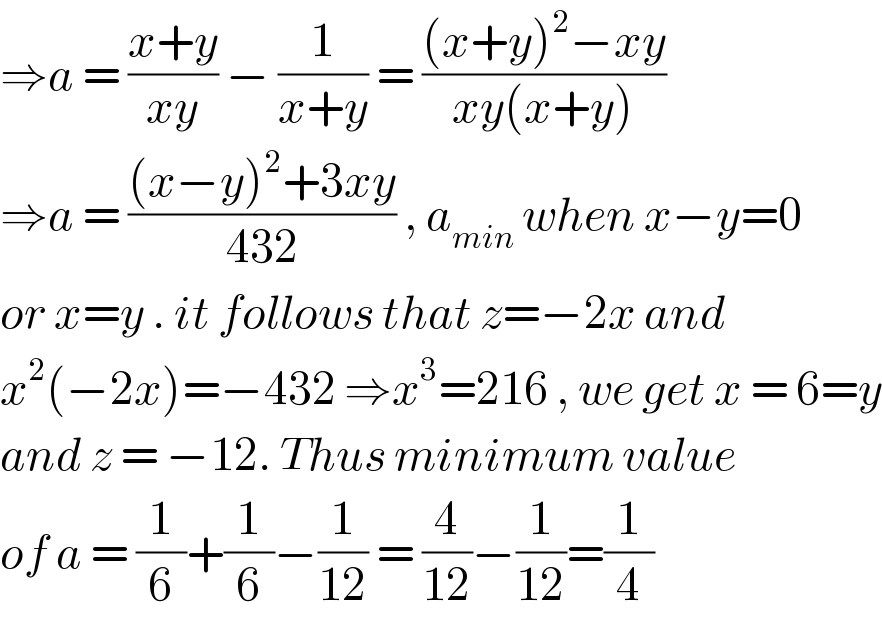
Question Number 118239 by ZiYangLee last updated on 16/Oct/20

$$\mathrm{Given}\:\mathrm{that}\:{x},{y},{z}\:\mathrm{are}\:\mathrm{real}\:\mathrm{numbers}\:\mathrm{such}\:\mathrm{that} \\ $$$${x}+{y}+{z}=\mathrm{0}\:\mathrm{and}\:{xyz}=−\mathrm{432}. \\ $$$$\mathrm{If}\:{a}=\frac{\mathrm{1}}{{x}}+\frac{\mathrm{1}}{{y}}+\frac{\mathrm{1}}{{z}},\:\mathrm{find}\:\mathrm{the}\:\mathrm{smallest}\:\mathrm{possible} \\ $$$$\mathrm{value}\:\mathrm{of}\:{a}. \\ $$
Answered by 1549442205PVT last updated on 16/Oct/20

$$\mathrm{Since}\:\mathrm{x}+\mathrm{y}+\mathrm{z}=\mathrm{0},\mathrm{among}\:\mathrm{of}\:\mathrm{thee}\:\mathrm{numbers} \\ $$$$\mathrm{there}\:\mathrm{exists}\:\mathrm{least}\:\mathrm{at}\:\mathrm{one}\:\mathrm{positive}\:\mathrm{number} \\ $$$$\mathrm{WLOG}\:\mathrm{suppose}\:\mathrm{z}>\mathrm{0} \\ $$$$\mathrm{a}=\frac{\mathrm{1}}{\mathrm{x}}+\frac{\mathrm{1}}{\mathrm{y}}+\frac{\mathrm{1}}{\mathrm{z}}=\frac{\mathrm{xy}+\mathrm{yz}+\mathrm{zx}}{\mathrm{xyz}}=\frac{\mathrm{xy}+\mathrm{yz}+\mathrm{zx}}{−\mathrm{432}} \\ $$$$=\frac{\left(\mathrm{x}+\mathrm{y}+\mathrm{z}\right)^{\mathrm{2}} −\left(\mathrm{x}^{\mathrm{2}} +\mathrm{y}^{\mathrm{2}} +\mathrm{z}^{\mathrm{2}} \right)}{−\mathrm{432}.\mathrm{2}}=\frac{\mathrm{x}^{\mathrm{2}} +\mathrm{y}^{\mathrm{2}} +\mathrm{z}^{\mathrm{2}} }{\mathrm{864}} \\ $$$$=\frac{\mathrm{x}^{\mathrm{2}} +\mathrm{y}^{\mathrm{2}} +\left(\mathrm{x}+\mathrm{y}\right)^{\mathrm{2}} }{\mathrm{864}}=\frac{\mathrm{2}\left(\mathrm{x}+\mathrm{y}\right)^{\mathrm{2}} −\mathrm{2xy}}{\mathrm{864}} \\ $$$$=\frac{\mathrm{z}^{\mathrm{2}} +\frac{\mathrm{432}}{\mathrm{z}}}{\mathrm{432}}=\frac{\mathrm{z}^{\mathrm{2}} +\frac{\mathrm{216}}{\mathrm{z}}+\frac{\mathrm{216}}{\mathrm{z}}}{\mathrm{432}} \\ $$$$\geqslant\mathrm{3}\:^{\mathrm{3}} \sqrt{\mathrm{z}^{\mathrm{2}} .\frac{\mathrm{216}}{\mathrm{z}}.\frac{\mathrm{216}}{\mathrm{z}}}/\mathrm{432}=\frac{\mathrm{3}.\mathrm{6}^{\mathrm{2}} }{\mathrm{36}.\mathrm{12}}=\frac{\mathrm{1}}{\mathrm{4}} \\ $$$$\mathrm{The}\:\mathrm{equality}\:\mathrm{ocurrs}\:\mathrm{if}\:\mathrm{and}\:\mathrm{only}\:\mathrm{if} \\ $$$$\begin{cases}{\mathrm{z}^{\mathrm{2}} =\frac{\mathrm{216}}{\mathrm{z}}}\\{\mathrm{x}+\mathrm{y}+\mathrm{z}=\mathrm{0}}\\{\mathrm{xyz}=−\mathrm{432}}\end{cases}\Leftrightarrow\begin{cases}{\mathrm{z}=\mathrm{6}}\\{\mathrm{x}=\mathrm{6}}\\{\mathrm{y}=−\mathrm{12}}\end{cases} \\ $$$$\mathrm{Thus},\mathrm{a}_{\mathrm{min}} =\frac{\mathrm{1}}{\mathrm{4}}\:\mathrm{when}\:\left(\mathrm{x},\mathrm{y},\mathrm{6}\right)=\left(\mathrm{6},−\mathrm{12},\mathrm{6}\right) \\ $$$$\mathrm{and}\:\mathrm{all}\:\mathrm{its}\:\mathrm{permutation} \\ $$$$ \\ $$
Commented by ZiYangLee last updated on 16/Oct/20

$$\mathrm{wow}! \\ $$
Answered by bobhans last updated on 16/Oct/20

$$\Rightarrow{a}\:=\:\frac{{x}+{y}}{{xy}}\:−\:\frac{\mathrm{1}}{{x}+{y}}\:=\:\frac{\left({x}+{y}\right)^{\mathrm{2}} −{xy}}{{xy}\left({x}+{y}\right)} \\ $$$$\Rightarrow{a}\:=\:\frac{\left({x}−{y}\right)^{\mathrm{2}} +\mathrm{3}{xy}}{\mathrm{432}}\:,\:{a}_{{min}} \:{when}\:{x}−{y}=\mathrm{0} \\ $$$${or}\:{x}={y}\:.\:{it}\:{follows}\:{that}\:{z}=−\mathrm{2}{x}\:{and}\: \\ $$$${x}^{\mathrm{2}} \left(−\mathrm{2}{x}\right)=−\mathrm{432}\:\Rightarrow{x}^{\mathrm{3}} =\mathrm{216}\:,\:{we}\:{get}\:{x}\:=\:\mathrm{6}={y} \\ $$$${and}\:{z}\:=\:−\mathrm{12}.\:{Thus}\:{minimum}\:{value}\: \\ $$$${of}\:{a}\:=\:\frac{\mathrm{1}}{\mathrm{6}}+\frac{\mathrm{1}}{\mathrm{6}}−\frac{\mathrm{1}}{\mathrm{12}}\:=\:\frac{\mathrm{4}}{\mathrm{12}}−\frac{\mathrm{1}}{\mathrm{12}}=\frac{\mathrm{1}}{\mathrm{4}} \\ $$
